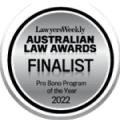
CONTACT
Sydney Most Awarded Immigration Lawyers








Immigration Lawyers Sydney | Immigration Solutions
Immigration Solutions Lawyers™, formerly known as Anne O’Donoghue & Associates, has been a leading Immigration Law Firm in Sydney for over 31 years. Immigration Solutions Lawyers has been assisting clients in navigating the different avenues of migration to Australia since 1993 and has formulated success for Applicants and Businesses alike by taking an expert and collaborative approach.
Our expertise extends through to all Visa Subclasses, from Preparation, Lodgement and Appeal, if required. The complexity of Visa Applications is what Immigration Solutions Lawyers is renowned for, as Character Concerns, Non-Disclosure Issues and Refusals are intricate legal processes which require a team of expert solicitors.
Real Reviews - Real Outcomes
Brian Gunsett
October 17, 2023
Australia Immigration

I had an amazing experience working with Anne, Heshna and the entire Team at Immigration Solutions. The knowledge, open line of communication and sense of urgency was top notch.
ANKE VULETIC
JUNE 30, 2023
Canada Immigration

Excellent experience with my citizenship application process. The team took me through the process step by step and answered all questions (and I had many). They were also extremely patient with me.
EDMUND WONG
AUGUST 30, 2023
Canada Immigration

I can’t express my gratitude enough to ISL. In the midst of countless uncertainties and difficulties, they came through for my family in record time and resolved our problem.
-
I was in a real scary position with my visa and I really thought I was destined for failure. After reaching out to this team I was relieved and felt better instantly after the phone call. They went to work immediately and got me on a the right path. Worth every penny spent and treated me like I was the most important client. Will highly recommend to all my friends who need help. I will forever be thankful of this team and shout out to Jane and Diane Markantonakis as they were the real deal and kept me here and understanding of the law.
William Murphy
October 14, 2024Having Immigration Solutions Lawyers support me throughout my immigration process, from the first visa to PR to citizenship, was incredibly valuable. Their knowledge and professionalism made all the difference in what could be a stressful process. I would recommend them for their understanding of how the system works and what is required. They have always provided a reassuring level of clarification, which made my journey really straightforward.
Ana Carolina
September 17, 2024Hi.. I don’t have words today that how to thank whole team of immigration solutions who helped me in getting grant of PR. Mine was a complex case but we trusted Anne and team and today after getting my PR, I can say that they are the Best in city. A whole professional team who work with ease with their clients and very very helpful throughout the process. They know their job and only they can make things happen when one has no hope. Once again, I thank Anne, Reema, Jane and team who turned my dream into reality. I recommend them to everyone who are looking for reliable lawyers.
G.P. SINGH
August 17, 2024 -
Immigration Solutions Lawyers were instrumental in helping me get Australian Citizenship by Descent. They knew exactly what approach to take and guided me through the whole process in great detail. They were prompt, professional and courteous at all times. I felt well looked after and knew I was in safe hands. I'd like to give particular thanks to Diane Markantonakis and Anne O’Donoghue; thank you!!
mark burcher
August 17, 2024Immigration Solutions helped with a subclass 186 Visa Application. Very happy with the outcome.
cyril d'monty
July 17, 2024Our name's are John &Dung Scott we employed Immigration Solutions Lawyers back 2019 just prior to the covid-19 debacle. Without the guidance of Anne O’Donoghue and her team solicitors, we believe that there would have been no way we could have dealt with the immense and comprehensive explanations of our lives and reasons why we desired for Dung to become my wife and live here in Australia with me . Saying that we are truly grateful to you all to the staff who answered our calls the people in the back ground such as Michael, Reema ofcourse Anne, but we would especially like to thank Jane for her efforts and the sensitivity shown to us. Which kept us positive through it all to achieve permanent residency 801 in 2024 so with deep and sincere thanks God bless. John & Dung.
John Scott
July 17, 2024 -
I personally want to thank the entire immigration solution team, who managed to get my permanent visa granted, my conditions were very difficult and they, with excellent work and dedication, achieved this very important goal in my life. excellent work team, very good guides to make the best decisions highly recommended for visas that are difficult to obtain. Im very thankful . I am very grateful to all of you, thank you very much for being the very best in your area.
Anna Manottas
July 17, 2024The team who handled my case did phenomenal job. Even though it took 5 years ( it was my fault because of my circumstances and somewhere I was a little lazy ) I still got my visa ! I just couldn't believe it when I received my 801. Please if anyone is reading this review please please don't look anywhere else. These folks right here are less lawyers and more magicians! They will make it work no matter work. If you are a genuine couple and looking to stay in Australia this should be your first and last choice. I can't thank them enough at this point.
Teffi Tales
June 17, 2024We are celebrating a Ministerial Intervention granted visa notice. Our journey began 2 years ago with no hope or options regarding our situation. Immigration Solutions Lawyers team have been nothing but helpful and extremely professional regarding our situation. They helped us come up with solutions when everyone else said that there were no more options for us. We are very thankful and can say that if everyone worked that diligently then many more visas would receive a grant notice. Thank you very much for allowing us this opportunity.
kristine kugrena
June 17, 2024 -
My partner and I have been living and working in Australia for almost 12 years, in February 2018 we applied for PR through the employer nomination scheme, more than 4 years had passed since we submitted our application, we knew something was up as the standard waiting time for approval is generally 6 months, in July 2022 we received the dreadful news that my employer had been under investigation by ABF for the past few years and due to adverse findings the ABF would be placing a sponsorship ban for a period of 4 years on my employer making my PR application viod and facing cancelation. We approached Immigration Solutions after being referred by a friend. Anne was very empathic of our situation, we had limited options to move forward due to our age and financial position. Anne very kindly offered to do pro-bono work for us and got to work immediately on securing a long-term visa for us so we could remain in Australia. The pro-bono work to date has come to almost $20 thousands dollars. We had a great experience from the very start, Anne and her team were very helpful and a breeze to work with. Although immigration law can be complex through their expertise and experience they made it seem simple, they made us feel very comfortable along the journey and filled us with confidence throughout the entire process. We will be forever grateful for the generosity, dedication and hard work put into securing a visa for us. Special mention and thank you to Diane who worked very closely with us throughout the process, she is very hardworking and dedicated to her job, you can tell she loves what she does and aims for success in all cases. Thank you Anne, Diane and all of the team at Immigration Solutions. I highly recommend using their services.
Garry B
May 17, 2024We used Immigration Solutions to Apply for our onshore partner visa. We had a great experience from the very start. Anne and the whole team were very helpful and made us feel at ease throughout this very stressful process. Ours was a complicated case that involved an overstay and needed a Schedule 3 waived and the team were incredible in accomplishing that. Special Mention to Jane Liu who looked after us most of the time and always very helpful and very prompt in her email communication with us. Thank you Immigration Solutions Team!!
Daniela Olymbios
May 17, 2024We have had 6 separate application steps over the past 5 years & 8 months with our visa applications including gaining permission to travel during covid times. We have dealt with several staff members including, recently, Jane, Reema and Heshna. We cannot fault their work or professionalism or that of any other staff member. They have all been courteous, helpful and have always returned phone calls. Our visas have now all been approved and we highly recommend the services of Immigration Solutions. We appreciate their work and efforts greatly.
jw wj
May 17, 2024 -
Highly recommend. A great team very professional. I had lost hope of being able to stay in Australia but still here after 9 years.
Charlene M
May 17, 2024I used Anne and her team in 2014, and then recently referred a friend who was stuck offshore. Anne and her team were brilliant and got his visa granted within 2 weeks. A massive Thank you once again to Anne and her team.
Margaret Maharaj
April 17, 2024I had a good time working with the ISL team, namely Heshna, Anne, Diane, and Reema. They helped me achieve the best possible visa application outcome, enabling me to continue my studies here. I will recommend them to everyone, especially those with complex cases, as ISL delivers professional legal advice and practices.
Andy Z
April 17, 2024
Trending Articles
TEAM MEMBERS
Our Trusted Immigration Support Team
Immigration Solutions Lawyers employs a wide range of dedicated and driven lawyers and support staff. Each have proven and extensive experience in their fields of expertise and are committed to providing excellent service. The team has been handpicked by Mrs O’Donoghue herself with the aim of providing only the best customer service and legal advice available.
The office is contactable in person in Sydney CBD, and also offers consultations by telephone and Skype. For more information regarding our staff or for any questions please contact the office.

Anne O' Donoghue
Director & Principal Lawyer, Special Counsel Modern Slavery and Human Rights

Diane Markantonakis
Lawyer

Jane Liu
Lawyer

Lihini Konara
Senior Solicitor/Special Counsel

Palwasha Nawabi
Lawyer

Michael O'Donoghue
Client Service Manager

Noel Shea
Paralegal
Partner Visa
Immigration Solutions Lawyers are Australia’s leading Partner Visa specialists, with both Onshore Partner Visas and Offshore Partner Visa applications expertly processed. The most common Partner Visa is the onshore partner visa where the immigration applicant can be onshore throughout the entirety of the visa application. The process begins with the temporary Partner visa (Subclass 820) and is the first stage towards a permanent Partner Visa (Subclass 801). The offshore partner visa application acts as a transitional visa from the provisional Partner Visa (Subclass 309) to the permanent Partner Visa (subclass 100).
The Australian Government Department of Home Affairs states that to be eligible for a temporary Subclass 820 and Permanent Subclass 801 visa the Applicant and Sponsor must be able to show the Department of Immigration and Border Protection that they are in a genuine and ongoing relationship, consenting freely to the relationship and to the exclusion of all others. The Subclass 820 and Subclass 801 visa application process requires that the Applicant is the spouse or de facto partner of an Australian citizen, Australian permanent resident or eligible New Zealand Citizen. The Applicant and Sponsor must be in Australia when they apply and when the visa is decided.
For married applicants, the marriage must be valid under Australian Law. Underage and polygamous marriages are not legal or valid in Australia. Same sex couples can apply for this partner visa as a de facto Applicant. For de facto Applicants, the Department generally requires the de facto relationship to have existed for 12 months prior to lodging the application. There are however some circumstances where the visa may be lodged prior to the 12-month criteria including if there are compelling and compassionate circumstances that warrant the visa being granted or the de facto relationship has been registered.
The provisional partner Subclass 309 and migrant partner Subclass 100, is the same as the Subclass 820/801 Visa application process except the applicant is required to be outside Australia at the time of application and until the Subclass 309 is granted. The applicant can be onshore or offshore when the Subclass 100 visa is granted.



Family Violence
The Department may allow you to be granted permanent residency, if you relationship has broken down due to family violence, including but not limited to physical, emotional, psychological, financial, social and sexual abuse.
From 31 March 2023 a new instrument under the Migration Regulations 1994—Specification of evidentiary requirements—family violence is in place that reduces the burden placed on victims of family and domestic violence seeking a visa.
The new measures include adding midwives to the list of medical professions who can provide evidence; adding risk assessments and reports as types of evidence in lieu of statutory declarations; adding additional advocacy and crisis service providers who can provide evidence and removing the statutory declaration requirement for some healthcare professionals.
Resident Return Visa
A successful Resident Return Visa Application allows you to travel abroad and maintain your permanent residence status on your return to Australia. Similarly, if you are a former Australian Citizen, the Resident Return Visa allows you to return to Australia as a Permanent Resident. Australian Citizens are the only people who have automatic right of entry to Australia. All other persons are required to hold a visa, including Australian Permanent Residents. Permanent Residents can remain in Australia indefinitely, however if they wish to travel, they must ensure that they have a valid travel facility attached to their visa. If a Permanent Resident chooses to travel without a valid travel facility, they run the risk of losing their Permanent Residency status.
Resident Return Visas (RRV) are designed for current Australian Permanent Residents who wish to travel overseas whilst maintaining their Australian Permanent Resident status. The RRV’s also allow former Australian Permanent Residents and former Australian citizens (who have lost or renounced their Australian citizenship) an opportunity to return to Australia and regain permanent resident status.
Applications can be submitted onshore or offshore, however if an Applicant applies offshore, they must be offshore when a decision is made. There are two main subclasses of Resident Return Visas being the subclass 155 and the subclass 157. Each visa subclass is distinguished by relevant criteria, and in turn determines the length of the travel facility granted. A Resident Return Visa can provide a 5-year, 1-year or 3-month travel facility from the date of grant, allowing travel within that period only. Once the visa expires, a new Resident Return Visa application will need to be granted prior to travelling.


Visitor Visa (Subclass 600)
Visitor Visas are for applicants who are tourists, business visitors or looking to visit their family.
There are 6 different streams of Visitor Visas:

Tourist Stream- Apply Outside Australia
This stream allows visa holders to visit Australia as a tourist, to go on a cruise, or to visit family and friends. The visa could be granted for 3, 6 or 12 months. For this stream, Applicants must be outside Australia when they apply for the visa, and when the Department of Home Affairs decides the visa.

Tourist Stream- Apply In Australia
This stream allows visa holders to visit Australia as a tourist, to visit family and friends, or for purposes outside of business or medical treatment. The Department could grant the visa for up to 12 months. For this stream, Applicants must be in Australia when they apply for the visa, and when the Department of Home Affairs decides the visa. This stream may be suitable for Applicants that hold another visa that is expiring and would like to stay in Australia for longer.

Business Visitor Stream
This stream allows visa holders to visit Australia for business reasons. The Department could grant the visa for up to 3 months, and may let visa holders enter Australia once or many times while the visa is valid. Visa holders cannot work or sell goods or services while on this visa. For this stream, Applicants must be outside Australia when they apply for the visa, and when the Department of Home Affairs decides the visa.

Approved Destination Status Stream
This stream allows citizens from certain areas of China (excluding SARs) to visit Australia on a tour that has been organised by an approved travel agent. The Department will specify how long the visa holder’s stay is granted for in the grant letter. Visa holders must remain with the organised tour group during their time in Australia.

Frequent Traveler Stream
This stream allows citizens of the People’s Republic of China who travel often to Australia for business or personal reasons to continue doing so. The Department may grant the visa for up to 10 years, and the visa holder can stay up to 3 months every time they enter. Applicants must hold a passport from the People’s Republic of China (excluding SARs). Applicants must provide biometrics within the People’s Republic of China before applying.

Sponsored Family Stream
This stream allows people who are sponsored, usually by a family member, to visit Australia to see their family. The Sponsor must be an Australian citizen or permanent resident. The Department may ask the Sponsor for a security bond. For this stream, Applicants must be outside Australia when they apply for the visa, and when the Department of Home Affairs decides the visa.

Student Visa (Subclass 500)
The Student Visa allows visa holders to study an eligible course in Australia, travel in an out of Australia, and work up to 48 hours a fortnight during the study period.
Applicants must meet the following requirements:
- Apply online in or outside Australia
- Be enrolled in a course of study in Australia
Hold Overseas Student Health Cover (OSHC), or fall in an exemption category - Be 6 years or older
- For under 18s- prove there is a welfare arrangement in place
- If in Australia, hold an eligible substantive visa
- Have enough money for their stay
- Be a Genuine Student
With new Genuine Student Requirements introduced in March 2024, an Applicant must demonstrate that they are a genuine student. The Department of Home Affairs defines this, stating an Applicant/Student Visa Holder must must stay as a student and be able to show an understanding that studying in Australia is the primary reason of their student visa. The Genuine Student requirement is intended to include students who, after studying in Australia, develop skills Australia needs and who then go on to apply for permanent residence.
Australian Citizenship
There are multiple ways to become an Australian citizen, these include:
By conferral
- Permanent residents including New Zealand Special Category visa holders
- Person 60 years or over
- Permanent residents aged 15 years or under
- Born to a former Australian citizen
- Person born in Papua before independence in 1975
- Person with incapacity or impairment
- Born in Australia and are stateless
By conferral
- Your parent was an Australian citizen when you were born overseas
By adoption
- Your parent was an Australian citizen when you were born overseas
Become an Australian again
- For former Australian citizens
Generally, Applicants for Australian citizenship must meet the residence requirements. The Applicant must have lived in Australia for at least 4 years before applying, with no more than 12 months of absence. The Applicant must also have lived in Australia for at least 9 months out of the last 12 months before applying.
Applicants must also show a close and continuing link to Australia. The Department must be satisfied that the Applicant is likely to live or continue to live in Australia, or maintain a close and continuing link with Australia while overseas. During the assessment of the Applicant’s close and continuing link with Australia, the Department will consider their living arrangements and migration status.
Examples of evidence of a close and continuing link with Australia include:
- Employment contracts and pay slips.
- A letter from an organisation showing you have been offered a study or sporting opportunity outside Australia which includes the details of this opportunity.
- Receipts for payments associated with planned relocation, such as air fares or removalists.
- Letters confirming school enrolment, such as a school enrolment deposit receipt.
- Air fares and airline tickets with a return date if you have been outside Australia on an extended holiday.
Skilled Visas
Skilled visas allow visa holders to live and work in Australia. The skilled visa category includes the following main visa subclasses:
- Skilled Independent visa (subclass 189)
- Skilled Nominated visa (subclass 190)
- Temporary Graduate visa, graduate work stream (subclass 485)
- Skilled Regional (Provisional) visa (subclass 489)
- Skilled Work Regional (Provisional) visa (subclass 491)
Generally, Applicants would submit an expression of interest and wait to be invited to apply.
Applicants would need to satisfy the following:
- Have an occupation on a relevant skilled occupation list
- Have a suitable skilled assessment for the occupation
- Satisfy the points test
When submitting the expression of interest in SkillSelect, the Applicant will be given an indicative points score based on the claims that were made. 65 points need to be obtained to be invited to apply for the visa.


Employer Sponsored Visas
Employer sponsored visas allow skilled workers to live and work in Australia. The employer sponsored visa category includes the following main visa subclasses:
- Employer Nomination Scheme (subclass 186)
- Regional Sponsored Migration Scheme (subclass 187)
- Temporary Skill Shortage visa (subclass 482)
- Skilled Employer Sponsored Regional (provisional) visa (subclass 494)
Generally, Applicants must satisfy the following basic eligibility for employer sponsored visas:
- Be nominated by an approved Australian employer
- Meet the necessary skills, qualifications and English language requirements for the needs of the role
Employer Sponsored Visa’s assist Australian Businesses who are facing a shortage of skilled workers, to fill the gap and sponsor foreign talent. Eligibility ranges on a number of factor including, your occupation, your qualification, whether you require a skills assessment, your English language score and your post qualification experience.
Character Concerns for Visa and Citizenship Applications
To be granted an Australian visa or Australian citizenship, Applicants must satisfy the character requirements, and visa holders must remain of good character. If an Applicant or visa holder does not pass the character test, the Department may refuse or cancel a visa.
The most common reasons for failing the character test and having their visa or citizenship refused include the following:
- A substantial criminal record
- Past and present criminal or general conduct
The full list is contained in Section 501 of the Migration Act 1958 (Cth).
Although Applicants who fail the character test are more likely to experience a refusal, each application is decided on a case-by-case basis, so failing the character test does not necessarily mean an automatic refusal.
An Applicant is required to provide extensive submissions to mitigate the circumstances surrounding their criminal record and it is crucial to overcome this, to be granted any visa type in Australia.


Unlawful Spouses
The Migration Regulations 1994 sets out the ways in which a non-citizen may apply for particular visas. If you are unlawful currently in Australia, this limits the visa’s you can apply for. If you are unlawful, you may only apply for a Medical Treatment Visa, a Protection Visa and a Partner Visa.
If you or your partner is unlawful and you have an Australian Citizen or Permanent Resident Spouse, you may be eligible for a Partner Visa, regardless of your unlawfulness.

Second Time Partner Visa – Rule 1.20J:
Regulation 1.20J of the Migration Regulations is one of the most crucial regulations, particularly for those who are considering applying for one of the following visas:
- Partner (Provisional) visa
- Prospective Marriage (Temporary) visa
- Extended Eligibility (Temporary) visa
- Partner (Temporary) visa
Regulation 1.20J places limitations on multiple sponsorships, namely:
- A lifetime limitation of two sponsorships
- A 5-year gap between sponsoring a former partner and a new partner
- A 5-year gap for a person who became a permanent resident through a Partner visa to sponsor someone else
The main concern applicants often encounter is the limitation of sponsoring a maximum of 2 people in their lifetime.
The sponsorship limitations can be waived by the Minister if they are ‘satisfied that there are compelling circumstances affecting the sponsor’.
Examples of these ‘compelling circumstances’ include:
- The previous spouse or interdependent partner has died
- The previous spouse of interdependent partner has abandoned the sponsor or nominator, and there are children who require care and support
- The new relationship is long-standing; or
- There are dependent children of the new relationships
These examples are not exhaustive, and the unique circumstances of each situation will be taken into account.
General considerations for potentially waiving the bar on repeat sponsorship include:
- The nature of the hardship or detriment that would be suffered by the sponsor if the sponsorship were not approved
- The extent and importance of the ties the sponsor has to Australia, and the consequence hardship or detriment that would be suffered if the sponsorship were not approved, and the sponsor were to feel a need to leave Australia in order to maintain their relationship with the applicant

Administrative Appeals Tribunal
Most people think that the only option after a visa refusal is to depart Australia. However, what most people don’t know or realise are their rights and available options for them to rectify the situation including AAT Appeal and Ministerial intervention requests.
In reviewing the visa refusal decision, the case will be considered afresh, and the AAT has the power to change the decision under review.
In some cases, only the visa Applicant or former visa holder can apply for review, while in other cases, the Sponsor or a close relative of the Applicant may apply for review.
There are time limits for making the application for review- this will be in the decision letter sent by the Department of Home Affairs. The ‘Application for Review’ form can be lodged online or by email, post, fax or in person.
The review process varies on a case-by-case basis, but the general steps include the following:
- The AAT will send you an acknowledgement letter to confirm that the application has been received.
- The AAT will also inform the department of your application and request the department to provide them with all relevant documents about your case.
- The case is allocated to a Member.
- The Member reviews the documents.
- The AAT invites you to attend a hearing, and/or to provide information or to comment or respond to information.
- In some cases, the Member may announce the decision at the end of the hearing. The Member may decide to send you written reasons for the oral decision; in which case you will be sent the reasons within 14 days after the hearing.
- Alternatively, the Member may announce the decision and make an oral statement of the reasons for the decision at the hearing. If this occurs, you are entitled to make a written request within 14 days of the hearing for the Member to provide you with a written version of the decision and reasons which were stated at the hearing.
- However, in most cases a decision will not be made at the end of the hearing and when the Member makes a decision, the AAT will send you and the department a written statement of decision and reasons.
Ministerial Intervention Request
If an Applicant receives an unfavorable decision from the AAT, they may be eligible to submit a request for ministerial intervention.
The Minister has powers under the Migration Act 1958 (Cth) to replace a decision by the AAT if they believe it is in the public interest to do so.
Individuals may write to the Minister to submit the ministerial intervention request. The request must include the following information:
- Who is included in the request
- The Departmental reference number (such as the Client Identity number) if it is known
- A copy of the tribunal decision
- Information about the individual’s circumstances and why they are considered unique or exceptional
- Relevant supporting documentation
Unique or exceptional circumstances include the following:
- Strong compassionate circumstances that if not recognised would result in serious, ongoing and irreversible harm and continuing hardship to an Australian citizen or an Australian family unit, where at least one member of the family is an Australian citizen or Australian permanent resident.
- Compassionate circumstances regarding your age and/or health and/or psychological state, that if not recognised would result in serious, ongoing and irreversible harm and continuing hardship.
- Exceptional economic, scientific, cultural or other benefit that would result from you being permitted to remain in Australia.
- Circumstances not anticipated by relevant legislation; or clearly unintended consequences of legislation; or the application of relevant legislation leads to unfair or unreasonable results in your case.
- You cannot be returned to your country/countries of citizenship or usual residence due to circumstances outside your control.
These types of unique or exceptional circumstances are not exhaustive.

